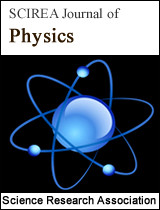Responses to Frequency Modulation in a Quantum Harmonic Oscillator
DOI: 313 Downloads 17081 Views
Author(s)
Abstract
A quantum harmonic oscillator with a frequency modulation is an extensively studied model, and has relevance to important physical processes. In this paper we consider response of the frequency modulation in terms of the time dependence of quasi energies and the deviation from the quantum virial theorem. Four modulation types\- linear, quadratic, exponential, and sinusoidal-are considered. In all cases the average potential and the average kinetic quasi-energies as well as the deviation from the quantum virial theorem exhibit oscillations in response to frequency modulation. A comparative study of the responses for these modulation types are given.
Keywords
Time-dependent harmonic oscillator, Frequency modulation, quasienergy, quantum virial theorem
Cite this paper
Chang Jae Lee,
Responses to Frequency Modulation in a Quantum Harmonic Oscillator
, SCIREA Journal of Physics.
Volume 4, Issue 1, February 2019 | PP. 8-16.
References
| [ 1 ] | Ramos-Prieto, I., Urzúa-Pineda, A. R., Soto-Eguibar, F., & Moya-Cessa, H. M. (2018). KvN mechanics approach to the time-dependent frequency harmonic oscillator. Scientific reports, 8(1), 8401. doi:10.1038/s41598-018-26759-w; and references cited therein. |
| [ 2 ] | Tobalina, A., Palmero, M., Martínez-Garaot, S., & Muga, J. G. (2017). Fast atom transport and launching in a nonrigid trap. Scientific reports, 7(1), 5753. doi:10.1038/s41598-017-05823-x. |
| [ 3 ] | Fock, V. (1930). Bemerkung zum Virialsatz. Zeitschrift für Physik A. 63 (11): 855–858. |
| [ 4 ] | Lewis, H.R. and Riesenfeld, W.B. (1969). An Exact Quantum Theory of the Time-Dependent Harmonic Oscillator and of a Charged Particle in a Time-Dependent Electromagnetic Field. Journal of Mathematical Physics, 10, 1458. http://dx.doi.org/10.1063/1.1664991. |
| [ 5 ] | Lewis, H. R. (1968). Class of exact invariants for classical and quantum time-dependent har- monic oscillators. J. Math. Phys., 9, 1976. |
| [ 6 ] | Milne, W. E. (1930). The numerical determination of characteristic numbers. Phys. Rev. 35, 863. |
| [ 7 ] | Pinney, E. (1950). The nonlinear differential equation y′′ + p(x)y + cy−3 = 0. Proc. of the American Math. Soc. 1, 681. |
| [ 8 ] | Macedo, D. X. and Guedes, I. (2015). Time-Dependent Coupled Harmonic Oscillators: Classical and Quantum Solutions, in Quantum Foundations and Open Quantum Systems: Lecture Notes of the Advanced School, (editors) Nieuwenhuizen, T., et al. World Scientific Publishing Co. Pte. Ltd., Singapore. |
| [ 9 ] | See for example, Bayfield, J. E. (1999). Quantum Evolution: An Introduction to Time-Dependent Quantum Mechanics, Wiley, New York. |
| [ 10 ] | The linear modulation case was considered in different contexts in: Lee, C. J. (2018). Dynamics of wave packet in a harmonic potential with linear frequency chirp. J. of Smart Technol., Vol. 3, No. 2 (in press). |

